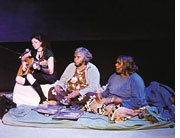Pointed play
 An innovative Australian play highlights the dire status of Australia's indigenous people. Ngapartji Ngapartji, staged at the Sydney Theatre festival held in the third week of January, is based on the forced removal of people from their traditional land in the Central Desert for British atomic weapons testing during the Cold War. The play is being staged in English and the aboriginal language Pitjantjatjara. Audiences are asked to visit a website, www.ngapartji.com/, and learn some of the language before seeing the show.
An innovative Australian play highlights the dire status of Australia's indigenous people. Ngapartji Ngapartji, staged at the Sydney Theatre festival held in the third week of January, is based on the forced removal of people from their traditional land in the Central Desert for British atomic weapons testing during the Cold War. The play is being staged in English and the aboriginal language Pitjantjatjara. Audiences are asked to visit a website, www.ngapartji.com/, and learn some of the language before seeing the show.
Learning the language would be instructive with actors encouraging the audience to pitch in. Ngapartji Ngapartji literally means "I give you something, you give me something'. It dramatizes the aboriginal people's first encounter with whites, complete with a mimed, prancing British horse and a military twit. It includes the religious missions, stolen kids and family tales and features various traditional and pop songs, all in Pitjantjatjara. The handover of Spinifex Country for British nuclear testing in 1953 is a prominent passage in the play.
The play starts with a singalong of Heads, Shoulders, Knees and Toes (here Kata, Alipiri, Muti, Tjina). But with the bones of the dead ground up by scientists looking to find effects of radioactive leaks, the innocent children's song acquire a gruesome resonance. Yet the work has a lightness of touch and supple vitality particularly in a heart-stabbing account of the black mist that brought disease and death, told with the simple authenticity of a young sufferer.
Related Content
- Order of the Supreme Court regarding installation of flue gas desulfurization units in thermal power plants, 29/04/2025
- Activating the green recovery action plans in Africa through nature-based solutions and natural capital approaches
- Food systems governance and the environmental agenda
- Order of the National Green Tribunal regarding discharge of untreated sewage in Pamari drain which is adding to pollution of river Yamuna, 29/08/2023
- An assessment of wildlife trade between Madagascar and Southeast Asia
- Intermediary cities and climate change: an opportunity for sustainable development
